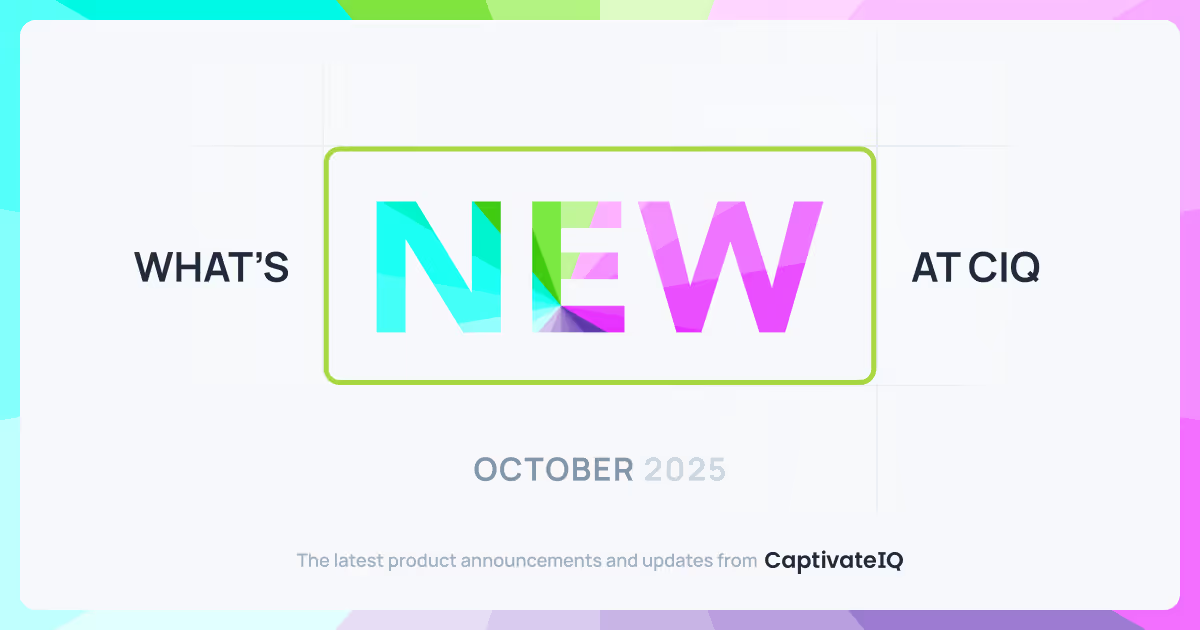Building A World-Class Platform For Sales Compensation: Why I Joined CaptivateIQ as VP of Engineering
Meet Nahi Ojeil, Vice President of Engineering at CaptivateIQ. Nahi brings strong technical chops to our growing engineering team as we continue to enhance our software and deliver a best-in-class experience to our customers. Before joining CaptivateIQ, Nahi held engineering leadership positions at Dropbox and Commure. His platform approach at Dropbox offers valuable insights into scaling and securing enterprise-grade platforms used by the world's largest companies. In this blog post, Nahi explains why sales compensation management is so difficult — from both a technical and functional perspective.
I recently joined CaptivateIQ as Vice President of Engineering. One of the most common questions I get from friends and candidates is why I decided to work on sales compensation software. After working at Google and Dropbox, building and operating exabyte scale platforms with some of the most complex technical challenges, what could be so interesting about sales compensation?
The reality is I had the same thought the first time a recruiter reached out to me about this role. In fact, I initially ignored this opportunity completely! Thankfully, a few weeks later, a trusted colleague mentioned CaptivateIQ and highly recommended that I talk to the team and learn more. After my first chat with Hubert (one of the co-founders), I was completely intrigued by what the team was building, the problem space more generally, the business opportunity, and clear signals of what I can only describe as an incredibly thoughtful, mature, and well-run company.
I would not be surprised if many people have the same initial reaction, and I will do my best to give many of you a reason to take that first call.
Why is sales compensation management so important?
This is also a common question that people ask — and one of the first things I tried to understand. I can boil this down to three core reasons.
- Commissions are universal. I was surprised by how many organizations offer some form of variable pay to their employees. Some of the latest statistics in the United States place that number between 70 and 80 percent of organizations! This is a universal problem across the world that affects a lot more people and industries than I ever imagined.
- Commissions fuel business growth. Sales compensation is the most powerful tool to create a clear alignment of incentives between the success of the company and those tasked with selling its products. Similar to how some companies create that alignment by issuing equity to employees to make them part owners that benefit from future success, commissions create an even more immediate and unambiguous alignment.
- Commissions provide a livelihood. Many people get a large portion of their compensation from commissions and rely on it for their livelihood. However, calculating commissions is very complicated, with many variables affecting these people’s compensation from month to month. Providing them with transparency and a great experience to understand and trust that process is paramount.
Why is sales compensation management so hard?
The next natural question for me was why this is a hard problem. There clearly isn’t a great solution out there yet as a majority of companies today still use spreadsheets to manage sales commissions.
So why is that?
- Choice between powerful or usable. There is a very natural tension between the flexibility necessary to model commissions and the need to make it easy to build and manage those plans. I had assumed that commissions were a simple function of revenue sold, however, I quickly learned how wrong I was. Factors taken into account when calculating commissions beyond revenue can include the length of the contract, margins, the actual start date of the contract, and even the specific SKUs sold. Add on top of that ramps, accelerators, and many other factors, and suddenly it became clear how this was much more multivariable calculus than simple arithmetic.
- Change is constant. Employees and organizations constantly evolve in dynamic environments. Employees change roles, organizations shift strategy, and all of that continues to happen at a faster pace than ever before. Being able to reflect all these changes in commission plans over time is hard.
- Disconnected data silos. The data that is needed to calculate commissions is scattered. From the HR systems that are the source of truth for your employees and the reporting hierarchies to the source of truth for individual quotas to the source of truth for closed deals — all the way through the source of truth for getting paid for sales, and the systems needed to process the payment to these employees.
- Complex and sensitive workflows. The workflows needed to manage and pay commissions are complex as well. Some examples include ensuring the right visibility and approvals for sensitive data such as the amount an employee is getting paid, ensuring the appropriate processing of inquiries when any numbers do not look right to the employee, and many others.
Why is sales compensation management a hard technical problem?
Once I was convinced that this was indeed an important and hard problem to solve, I still needed to convince myself that there were technical challenges behind all of this.
Even though scale in itself could make many problems technically challenging, I would argue that what makes a problem challenging are the constraints that exist in delivering a solution. For example, if you look at an embedded software system, the complexity is really high given the physical constraints, even though you are dealing with a significantly smaller scale. In other problem spaces, data quality is the biggest challenge. Dependencies on less reliable external systems or near zero failure tolerance for healthcare software can also pose challenges.
Some of the constraints that CaptivateIQ is working with, to highlight a few, include:
- Running complex calculations on large data sets in near real time in a cost-effective way is hard. Here’s why: Many payouts require millions of records to be part of the calculation, with a very large number of transformations (e.g., joins) across worksheets. There’s also a large number of formulas and calculations that need to be computed on the spot due to the dynamic nature of the data, and ultimately a very high bar for correctness to ensure accurate payouts.
- Supporting bursty workloads efficiently while keeping customer isolation requires work. Customers of various sizes, processing complexities, and usage patterns expect the product to scale to their needs in real time. Typical serverless architectures do not support the memory and compute intensity of our workloads, among other issues. It is important that we solve this problem while keeping in mind fairness across customer resources and the cost of significantly overprovisioning our platform.
- The technical solutions cannot be built in isolation from the user experience. We are providing users with a lot of the flexibility and control of building and managing their commission plans. As a result, we need to make sure the tradeoffs we make do not deliver efficiencies at the expense of the user experience. Many other solutions have created rigidity in their product to make things work, and that has clearly been a source of frustration for customers.
I hope this post helps create a bit more appreciation for the importance and challenges of sales compensation management. For those of you who feel excited about tackling these complex and impactful challenges — the same way I was after going through this exploration of the problem — we are hiring across the board for all engineering roles across all locations!
Feel free to also connect with me on LinkedIn or reach out directly if you are interested in learning more! We are just getting started!
.svg)


.png)


.avif)


